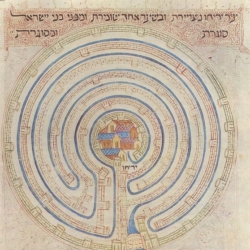| Source (Hebrew) | Translation (English) |
|---|---|
אֶהְיֶה בְּעֵדֶן גַן יִחוּדֶךָ תְּקַבֵּל צִדְקָתוֹ: |
Ehyeh/I-will-be in (Gan) Aden the garden of your unification; (there) you will receive his righteousness. |
קְשׁוֹב רְצֵה עֲתִירָה שְׁמוֹר טַהֲרַת נִשְׁמָתוֹ: |
Listen, accept, entreat, guard (the) purity of his soul. |
נָאוֹר גִבּוֹר דְגָלֶיךָ יֳאִירוּ כְּבוֹד שִׁבְתּוֹ׃ |
Enlightened mighty one, shining be your pennants, Kavod (resplendent spirit) of his Shabbat. |
בְּרוֹב טוּבְךָ רוֹעֶה צְדָקָה תְּרוֹמֵם גְדוּלָתוֹ׃ |
Through the abundance of your beneficence, righteous shepherd, his greatness will be exalted. |
חָסִין קָרֵב בִּרְצוֹן טוֺב נוֹפֶשׁ עֲלִיָיתוֹ׃ |
Draw near protection — with beneficent will sustain his ascent. |
יִוָדַע גְאוּלָתְךָ לַחְזוֹת פְּאֵר זִיו קְדוּשָׁתוֹ׃ |
Your redemption will be known in anticipation of such splendor: a ray of his holiness. |
שׁוֹכֵן קָרוֹב וּמֵטִיב צַוֵה יְשׁוּעַת תְּהִילָתוֹ׃ |
Dwelling near (now), (you are) doing well, directing the help of his adoration. |
וַיִרְכַּב עַל כְּרוּב וַיָעֹף וַיֵדֶא עַל כַּנְפֵי רוּחַ׃ (תהלים יח:יא) |
And he will ride upon a keruv, and he will fly, fly upon the wings of the wind.[1] Psalms 18:11. |
יִשְׁקֵנִי מִנְשִיקוֹת פִּיהוּ כִּי טוֹבִים דֹדֶיךָ מִיָיִן׃ (שיר השירים א:ב) |
Kiss me from the kisses of his mouth that your love making is better than wine.[2] Song of Songs 1:2. |
אֵל אֱלֹהִים יְהוָֹה דִבֶּר וַיִקְרָא אָרֶץ מִמִזְרַח שֶׁמֶשׁ עַד מְבֹאוֹ׃ מִצִיוֹן מִכְלַל יוֹפִי אֱלֹהִים הוֹפִיעַ׃ (תהלים נ:א-ב) |
El Elohim YHVH — speak and call the earth from the east of the sun until its setting. Your perfection of the beauty of Elohim appeared, from Tsiyon. [3] Psalms 50:1-2. |
שְׁמַע יִשְׂרָאֵל יְהוָֹה אֱלֹהֵינוּ יְהוָֹה אֶחָד׃ (דברים ו:ד) |
Hear Yisrael, YHVH our elo’ah, YHVH is one/unique.[4] Deuteronomy 6:4. |
יְהוָֹה הוּא אֱלֹהִים׃ יְהוָֹה הוּא אֱלֹהִים׃ (תהלים ק:ג) |
YHVH is Elohim. YHVH is Elohim.[5] Psalms 100:3, Cf. Deuteronomy 4:35 and I Kings 18:39. |
יְהוָֹה מֶלֶךְ (תהלים י:טז) יְהוָֹה מָלָךְ (תהלים צג:א) יְהוָֹה יִמְלוֹךְ לְעוֹלָם וָעֶד׃ (שמות טו:יח) |
This 42 letter divine name acrostic piyyut appears in Aharon Berekhiah ben Mosheh of Modena’s ספר מעבר יבוק (Sefer Ma’avar Yaboq The Book of [Crossing] the Ford of Yaboq), containing prayers and liturgical ritual for the sick and dying. (The title is a reference to Yaaqov’s crossing of the River Yaboq in Genesis 32:23–25.) This piyyut in particular is found as part of a liturgy in support of a person on their deathbed. In Steven A. Moss’s thesis “The Attitude Toward Sickness, Dying and Death As Expressed in the Liturgical Works Maavor Yabok and Sefer Hahayiim” (HUC-JIR 1974), he writes,
The first paragraph of this prayer expresses the desire of the dying person for the Garden of Eden, in which one’s relationship with God is brought closer. Notice should be taken of the phrase “I will be in Eden” because it becomes a desired state.
This piyyut, as the previously discussed prayer “Ana B’Koaḥ,” is based upon the forty-two letters of God’s name. The first letter of each group of three words spells out the abbreviation of a demonic spirit….This prayer, however, is not found in Sheloh and Davidson’s Thesaurus of Medieval Poetry makes no earlier mention of it, that is, no earlier mention than its appearance in Maavor Yabok.
The usage, in the second paragraph, of verses from Song of Songs places an emphasis upon one’s relationship with God and upon the “kiss of death”. Moderns might call this an “easy death”, a going out of the soul. For the works under consideration, this can be seen as the hope that God will take one’s soul into the Garden of Eden.
The usage of sexual imagery at the time of death, is also quite intriguing. Here, in the midst of solemnity, love is expressed, that is, love between the dying person and God. This love between the two partners, which if the analogy may be extended, is consummated in death, concludes with the verses from the Sheron. The section of prayer from here until the moment of death is appropriately called the “verses of unity, consummation”.
Concerning these “verses of unification or consummation” it can be said that they resemble the concluding verses of the Ne’ilah service on Yom Kippur. The cabbalistic dynamics of these important verses are described in the following quotation from Maavor Yabok. Again, emphasis is placed upon the effect of the verses upon the harmony of the spheres, thereby influencing the Godhead.
The creator made the harmony in the higher worlds dependent upon the lower worlds, and therefore the higher worlds are not separated from the lover as it is written ‘And he will ride upon the cherub and he will fly’. First the spheres ride on malchut to harmonize it, and after, ‘and he will fly upon wings of the wind’ and with the verse ‘and He will kiss me from the kisses of His mouth that His love making is better than wine’, and thus ‘and Jacob kissed Rachel and he raised his voice and cried’; here there are seven worlds hinting at the seven kisses, seven breaths, that masculine clings to feminine, feminine with masculine, spirit with spirit, love with Foundation, and they are the foundation of seven and the seven which are spread out. ‘And he will ride upon the cherubs and he will fly’ ‘kiss me from the kisses of His mouth’ ‘God O God Lord’ ‘from Ẓion perfection of beauty’ ‘Hear O Israel’ ‘The Lord He is God, the Lord is One and His name is One.’ The Unity needs to join two hundred and forty-eight holy groups that they are by themselves from themselves to themselves and therefore ‘the Lord is One’ is connected with the Foundation letters [ ] the Foundation of Unity of ‘Hear O Israel’ Is the connection of Ayn Sof with the spheres and afterward is joined with them by Yesod. (see appendix XVIII)
Aside from the description of theosophical activity of each Lord of this prayer, the opening sentence shows the cabbalistic system’s stress upon the ability of man to directly influence the upper spheres.
After this piyyut and these “verses of unification”, various psalms are said. The Shema, which contains the customary and important words that are to be said at the time of death, does not stand by itself, as it does in Sefer Haḥayyim. Instead, it is part of other biblical verses (“verses of unification”) and psalms. This arrangement does not necessarily detract from the Shema, if anything, it expands its basic idea of the unity of God.
Many thanks to Rabbi Ben Newman for introducing me to this piyyut via his paper on the 42 letter name. –Aharon N. Varady.
Source(s)

Notes

“אֶהְיֶה בְּעֵדֶן | Ehyeh b’Aden :: A piyyut containing the 42 Letter Name, in Sefer Ma’avar Yaḇoq (1626)” is shared through the Open Siddur Project with a Creative Commons Attribution-ShareAlike 4.0 International copyleft license.










Leave a Reply